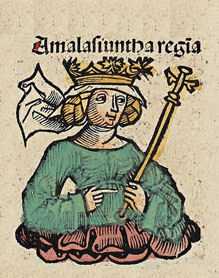Amalasuntha
| Amalasuntha | |
|---|---|
 Amalasiuntha regina - woodcut from the Nuremberg Chronicle (1493) | |
| Spouse |
Traguilla Eutharic |
| Issue |
Athalaric Matasuntha |
| Father | Theoderic the Great |
| Mother | Audofleda |
| Born | ca. 495 |
| Died | 535 (aged 39–40) |
Amalasuntha (also known as Amalasuentha, Amalaswintha, Amalasuintha, Amalswinthe or Amalasontha) (c. 495 – 30 April 534/535) was a queen of the Ostrogoths from 526 to 534. She was daughter of Theoderic the Great.
She was married in 515 to Eutharic (c. 480 – 522), an Ostrogoth noble of the old Amal line, who had previously been living in Visigothic Hispania, son of Widerich (born c. 450), grandson of Berismund (born c. 410), and great-grandson of Thorismund (died after 400), King of the Ostrogoths c. 400.
Her husband died, apparently in the early years of her marriage, leaving her with two children, Athalaric and Matasuntha (c. 517 – after 550), wife c. 550 of Germanus. On the death of her father in 526, her son succeeded him, but she held the power as regent for her son. Deeply imbued with the old Roman culture, she gave to that son's education a more refined and literary turn than suited the ideas of her Gothic subjects. Conscious of her unpopularity she banished, and afterwards put to death, three Gothic nobles whom she suspected of intriguing against her rule, and at the same time opened negotiations with the emperor Justinian I with the view of removing herself and the Gothic treasure to Constantinople. Her son's death in 534 made little change in the posture of affairs.
Now queen, Amalasuntha made her cousin Theodahad partner of her throne (not, as sometimes stated, her husband, for his wife was still living), with the intent of strengthening her position. The choice was unfortunate, for Theodahad fostered the disaffection of the Goths, and either by his orders or with his permission, Amalasuntha was imprisoned in the island of Martana in the Tuscan lake of Bolsena, where on 30 April in the spring of 534/535 she was murdered in her bath.
The letters of Cassiodorus, chief minister and literary adviser of Amalasuntha, and the histories of Procopius and Jordanes, give us our chief information as to the character of Amalasuntha.
The life of Amalasunta was made the subject of a tragedy, the first play written by the young Carlo Goldoni and presented at Milan in (1733).
Asteroid 650 Amalasuntha is named in her honour.
References
 This article incorporates text from a publication now in the public domain: Chisholm, Hugh, ed. (1911). "Amalasuntha". Encyclopædia Britannica (11th ed.). Cambridge University Press.
This article incorporates text from a publication now in the public domain: Chisholm, Hugh, ed. (1911). "Amalasuntha". Encyclopædia Britannica (11th ed.). Cambridge University Press.- Continuité des élites à Byzance durante les siècles obscurs. Les princes caucasiens et l'Empire du VIe au IXe siècle, 2006